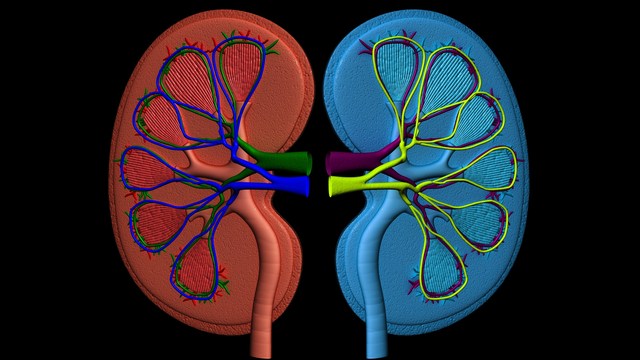Donating a kidney may save a person's life - but only if the conditions are precise.
Kidney donors must be related and immunologically matched to their donors – and even then, the recipient must take a lifetime of anti-rejection medications, which don’t guarantee the organ won't be rejected.
But a new clinical trial from Northwestern Memorial Hospital in Chicago, Ill. has shown how stem cells can be used to “trick” a recipient’s immune system into believing the new organ has been part of that person’s body all along.
The breakthrough has the potential to eliminate both the risks associated with kidney transplantation and the need for anti-rejection medications within one year after surgery.
“It’s the holy grail of transplantation,” said lead author Dr. Joseph Leventhal, transplant surgeon at Northwestern Memorial Hospital and associate professor of surgery and director of kidney and pancreas transplantation at Northwestern University Feinberg School of Medicine in Chicago, Ill. “This notion of being able to achieve tolerance through donor derived cells has been around for more than 50 years, but it’s translation to the clinic has been quite elusive. This article details the first successful attempt of this in mismatched and unrelated kidney recipients.”
The research was published Wednesday in the journal Science Translational Medicine, and it is the first study of its kind in which the donor and recipient were not related and did not have to be immunologically matched. Only 25 percent of siblings are immunologically identical, severely limiting the possibility of being a kidney donor.
The procedure worked by extracting a little bit more from the kidney donor than just their kidney. They also donated part of their immune system. About one month before surgery, bone marrow stem cells were collected from the donor and then enriched with “facilitating cells” – becoming stem cells that will ultimately fool the donor’s immune system allowing the transplant to succeed.
One day after the kidney transplant occurs, the facilitating cell-enriched stem cells are also transplanted in the recipient, which then prompts the formation of stem cells in the bone marrow. This then causes specialized immune cells – similar to the donor’s immune cells – to develop, creating a dual bone marrow system environment, so both the donor’s immune system and the recipient’s immune system function inside the person’s body.
Leventhal said that the ultimate goal is for the recipient to initially take anti-rejection medications but then slowly wean off of them within a year. According to Leventhal, the drugs come with their own share of negative side effects.
“The foundation of clinical transplantation revolves around the use of medicines and suppressive drugs to control the immune system,” Leventhal said. “These drugs have been very successful in reducing the rates of loss of organs due to acute rejection – where side effects include increase risk of infection and cancer, and metabolic side effects, such as the increase risk of hypertension and bone disease. But the drugs themselves are potentially harmful to the organs we transplant. Despite our ability to reduce rates of acute rejection, most individuals go on to lose organs because of chronic (long-term) rejection.”
One of the eight patients involved in the clinical trial, 47-year-old Lindsay Porter of Chicago, Ill., currently lives free of anti-rejection medication, sometimes forgetting she even had the kidney transplant in the first place.
“I hear about the challenges recipients have to face with their medications and it is significant,” Porter said. “It’s almost surreal when I think about it because I feel so healthy and normal.”
To qualify for this experiment, donors and recipients have to be blood-type compatible, and the recipient must not have antibodies in the blood that would reject the new kidney. Leventhal, along with co-author Dr. Suzanne Ildstad, director of the Institute of Cellular Therapeutics at the University of Louisville, hope to expand this research into a larger clinical trial and eventually make this procedure the standard of care used in kidney transplant recipients.
“This is a transformative clinical trial,” Leventhal said. “It will likely change the direction of how we approach immune tolerance in transplantation over next five to 10 years. This has been a long standing goal in the field. The fact that we’ve been able to show that tolerance is achievable and we can reproduce these findings in more than one patient, it opens the door to broader application for this approach.”
“It’s fair to say this could be a game changer,” Leventhal added.
Read more: http://www.foxnews.com/health/2012/03/07/stem-cell-research-allows-for-m...
w/ relateds:
World’s first liver, pancreas, and kidney transplant saves 6-yr-old’s life
http://www.foxnews.com/health/2012/03/08/worlds-first-liver-pancreas-and...
Helping amputees ‘Stand With Hope’
http://www.foxnews.com/health/2012/03/07/helping-amputees-stand-with-hope/
Concussion symptoms can persist in children a year after injury
http://www.foxnews.com/health/2012/03/06/concussion-symptoms-can-persist...





Add a CommentComments
There are no comments yet. Be the first one and get the conversation started!